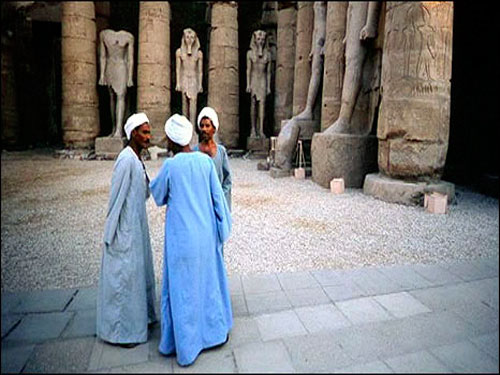Egyptian men's national costume
New fashion polyester fabric for dresses Linye Silk Co., Ltd. , http://www.decorative-fabric.com Galabeyya is Egypt's most popular man's robe with no collar, down to the ankles, short sleeves, most white, and other monochromatic colors. Since the beginning of the twentieth century, most urban residents have been abandoning Garabela’s gowns because of the influence of Westernization. Men have been given jackets or European-style trousers shirts or jackets. Westernization has the most obvious impact on urban residents. Rural farmers and urban laborers also wear the national characteristics of Galle Baja, and white-collar workers keep a distance from them. In the past two decades, the social atmosphere has been changing quietly. As a result, people in the community are increasingly wearing ethnic costumes. Young girls are gradually wearing their heads. This may not be a fashion trend, but a major change in social psychology, aversion to Western culture, and recognition of Egyptian cultural traditions. Men wearing Garebaia not only feel comfortable but also have a sense of national pride.
Galabeyya is Egypt's most popular man's robe with no collar, down to the ankles, short sleeves, most white, and other monochromatic colors. Since the beginning of the twentieth century, most urban residents have been abandoning Garabela’s gowns because of the influence of Westernization. Men have been given jackets or European-style trousers shirts or jackets. Westernization has the most obvious impact on urban residents. Rural farmers and urban laborers also wear the national characteristics of Galle Baja, and white-collar workers keep a distance from them. In the past two decades, the social atmosphere has been changing quietly. As a result, people in the community are increasingly wearing ethnic costumes. Young girls are gradually wearing their heads. This may not be a fashion trend, but a major change in social psychology, aversion to Western culture, and recognition of Egyptian cultural traditions. Men wearing Garebaia not only feel comfortable but also have a sense of national pride.
Egyptian parliament member Mustafa Kindy said that all Middle Eastern countries, only Egypt, regard their national costume as a base and become "inappropriate" in most public places. They must use their dress to show their status, status and education. . This phenomenon is a shame to Egyptian society. He said: "Actually, 70% of men in the society like to wear Galle-Bella, but in many occasions it is inappropriate to be self-satisfied." Galle-Bella is a standard Egyptian male national costume, and everyone is equal. Regardless of wealth, status, or religious belief, all Egyptians like to wear Galle-Béaar. They do not see who is **** and who is George. (George is a common name for sectarians and has a tenth in Egypt. One of the cultists.
The Egyptians once had a period of confusion, and some people shouted "Cancellation of Gallebayea." Those people were dazzled by Western culture and thought that it would be shameful for the Egyptians to wear a suit and pretend to be decent foreigners. As a result of escaping the ocean, the Egyptians lost their ethnic characteristics and did not recognize their ancestors. Jindi said: "Look at Saudis, Afghans, Pakistanis, and Oman. They show national self-esteem from their clothes." He hoped that Egypt should learn from them, go abroad, dare to wear their own national costumes, and demonstrate nationality. confidence.
Changes in clothing have also surfaced in the National Assembly. Gradually, there are parliamentarians wearing robes and attending meetings. Because there are more people, no one will look at them with strange eyes. A new proposal was discussed in the Congress and the government was required to publicly issue a decree declaring that Gallebeya was a national costume for Egyptian male citizens, replacing the imitation of Westernization, wearing dresses all over the place, and changing Egyptian social strangeness.
This is a controversial issue that has caused many discussions on the streets. There are many types of tasks that are inconvenient to wear robes. They have adapted to trousers, shirts, T-shirts or suit tops. A Cairo sabbatical teacher, Abu Dhuzalam Munir, said: "There is no need to make a fuss about clothing. Individuals who love the heart of Egypt cannot be measured by clothing. There are many things to care about now. The discussion of clothing is gossip and nothing happens. busy."
The female journalist Hob Gourdhi said that Egyptian civilization and social morality are far above the performance of clothing. Some bureaucratism does not mean embedding the Galle Biya to the working masses. Clothing is just metaphysical formalism. “The suit has become an international costume, and many Egyptians have also formed a habit of wearing suits and do not represent esteem. Everyone has the right to choose clothes, and varies from person to person, such as the famous Syrian actor Jamal Slay. Man dressed in Egypt's Galle-Béa, was handsome and handsome than the average man." She hopes that everything goes by nature, such as Arabs in the Gulf countries, no one forced them to wear what clothing, men and women like the Arab white windy robe. There is no need for anything to eat and dress.
